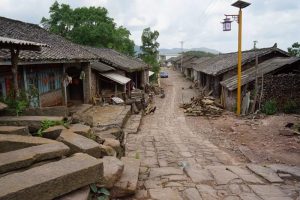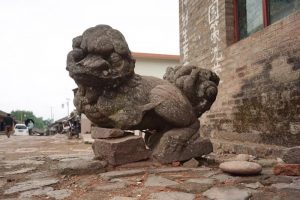Yibang Old Town in Mengla County, XishuangBanna
Overviw of Yibang Old Town
Yibang Old Town(倚邦古镇)which is one of the six famous ancient tea mountains in Yunnan is located in Xiangming Town(象明乡),the north of Mengla County(勐腊县),Xishuangbanna Dai Autonomous Prefecture. It is an important and famous Puer tea town and was also the prime place for tribute tea procurement in Qing Dynasty. Mansong tea(曼松茶), the raw material of Jingua tribute tea(金瓜贡茶)with over 200-year-history, is known as the best tea in Yibang Old Town(倚邦古镇) while the truth is that the Puer tea will be more fragrant with longer history.
Chinese Name:倚邦古镇
English Name: Yibang Old Town in Mengla County, XishuangBanna
Keywords: Yibang Old Town, Puer tea in Mengla County, Mansong tea
Location: Located in Xiangming Town(象明乡),the north of Mengla County(勐腊县),Xishuangbanna Dai Autonomous Prefecture
Formation and Development
The history of Yibang Old Town is difficult to examine in detail, however, it is certain that why the earliest people migrated to this remote mountain forest to settle down is closely related to the abundant tea tree resources here. As a conclusion, we know that there was tea first, and then there was the people and tea culture. Hence, Yibang Old Town gradually became the hub of the tea. A cluster of merchants gather together, making this town a thriving place in population and business. It can be said that the town is born of tea.

History
At the end of the Qing dynasty, the Puer tea production and trade center of the six famous tea mountains moved gradually to Yiwu Ancient Town(易武古镇)as the society was unrest, the banditry was rampant, the mainland merchants were afraid to trade in mountains, and the rise and development of the Yiwu ancient tea mountain. After 1912, Puer tea in Yibang Tea Mountain reappear the gradual recovery momentum in production and marketing. In 1942, Jinuo nationality and Yao ethnic groups revolted against Yibang ancient town, which turned the ancient town into a ruin.
In the historical record, Yibang, the street market on the top of the hill, was only a relaxation spot for the peddlers purchasing Puer tea here at first. The horse caravan has to stop here to relax and get supply, so it is also the starting point for the Ancient Tea-horse Road. Because of the rapid development of the tea, Yibang Old Town once grew to a famous tea distributing center besides Puer(普洱), Simao(思茅).
Several trade routes centered on Yibang Old Town of reliance radiating into the surrounding areas, lead to the mainland or the neighboring countries such as Vietnam, Laos, Thailand, Myanmar and other Southeast Asian countries. Year after year, the horse caravan overcame countless unbelievable hardships and created an ancient road, the Ancient Tea-house Road which carries the historic and profound economy and culture.
It is said that Mansong tea buds(曼松茶尖) that are picked before every Tomb-sweeping Day were erected with boiling water. In addition to its unique qualities, it was designated as the special tribute tea of the emperor. So there was a folk song in the local area sings like that: “There grows rare tea on the hills of Yibang Town(倚邦镇), which fascinates the emperor so much. The tea with good quality is on the Yibang Mountain(倚邦山)while Yiwu Town enjoys the good reputation.”
To the middle of Qianlong period, there planted mountains of tea trees in Yibang Mountain, stretching from Buyuanjiang River to Xikong Mountain, with a total area of more than 13 million square meters. Tea production and trade got its pomp, with more than 500 tons tea production every year. Some stone tablets recording the tea matters of the Qing dynasty witness the prosperity of Yibang Town as a result of the tea production and trade.
However, when we tread upon the curve and dusty the road with chuckholes in the forest to Yibang street, we can see that there is no former glory leaning on the street. What displayed in front of us are the old wrecked road, the obsolete rooms, and tranquil and peaceful street. In addition to the tread worn smooth road, it is so difficult to find out the morphology of the streets in the past days.

Attractions and Relics
There are a considerable historical site in Yibang Old Town, especially the well-preserved tea culture and history relics. The Ancient Tea-horse Road paved with grey and black stones stretching far away, records and manifests the extensive and profound Puer tea history and culture of the ancient tea mountains.
The main monument also contains the official tomb of local Chieftain Cao Dangzhai and his wife in Yibangzhai Village. Chieftain Cao who passed away in 1799 in Qing dynasty, was given the virtues monument(功德碑)by the imperial family in the second year of Emperor Qianlong(乾隆二年), which records the Cao family’s feats in managing the tribute Puer tea. According to that, it’s not difficult to figure out that Qing dynasty attaches great importance to the six famous ancient tea mountains.
There still maintains three green stone tablets of Qianlong(乾隆), Daoguang(道光) and Guangxu(光绪) period of Qing dynasty in the village committee, showing the significant tea events of that time. Visitors traveling to the tea worship hall beside the Mountain God Temple of Xinfazhai Village(新发寨)can still view the relics where the tea farmers and merchants sacrifice tea ancestor, Kongming(茶祖孔明)and the tea tree gods. Visitors can also see the prosperity of Puer tea in that days through the relics of the Jiangxi Temple(江西庙) in Anle Village(安乐村), the ruins of the Sichuan Guild Hall(四川会馆).
Attraction Transportation
Take a bus from Jinghoong Bus Station(景洪汽车站)to Mengla County(勐腊县), and then take a chartered bus or a taxi to the town.
Attraction Travel Tip
Traveling Hours: All day
Traveling Seasons: March to April

 7 Days GolfingTour
7 Days GolfingTour
 8 Days Group Tour
8 Days Group Tour
 8 Days Yunnan Tour
8 Days Yunnan Tour
 7 Days Shangri La Hiking
7 Days Shangri La Hiking
 11 Days Yunnan Tour
11 Days Yunnan Tour
 6 Days Yuanyang Terraces
6 Days Yuanyang Terraces
 11 Days Yunnan Tour
11 Days Yunnan Tour
 8 Days South Yunnan
8 Days South Yunnan
 7 Days Tea Tour
7 Days Tea Tour
 8 Days Muslim Tour
8 Days Muslim Tour
 12 Days Self-Driving
12 Days Self-Driving
 4 Days Haba Climbing
4 Days Haba Climbing
 Tiger Leaping Gorge
Tiger Leaping Gorge
 Stone Forest
Stone Forest
 Yunnan-Tibet
Yunnan-Tibet
 Hani Rice Terraces
Hani Rice Terraces
 Kunming
Kunming
 Lijiang
Lijiang
 Shangri-la
Shangri-la
 Dali
Dali
 XishuangBanna
XishuangBanna
 Honghe
Honghe
 Kunming
Kunming
 Lijiang
Lijiang
 Shangri-la
Shangri-la
 Yuanyang Rice Terraces
Yuanyang Rice Terraces
 Nujiang
Nujiang
 XishuangBanna
XishuangBanna
 Spring City Golf
Spring City Golf
 Snow Mountain Golf
Snow Mountain Golf
 Stone Mountain Golf
Stone Mountain Golf















